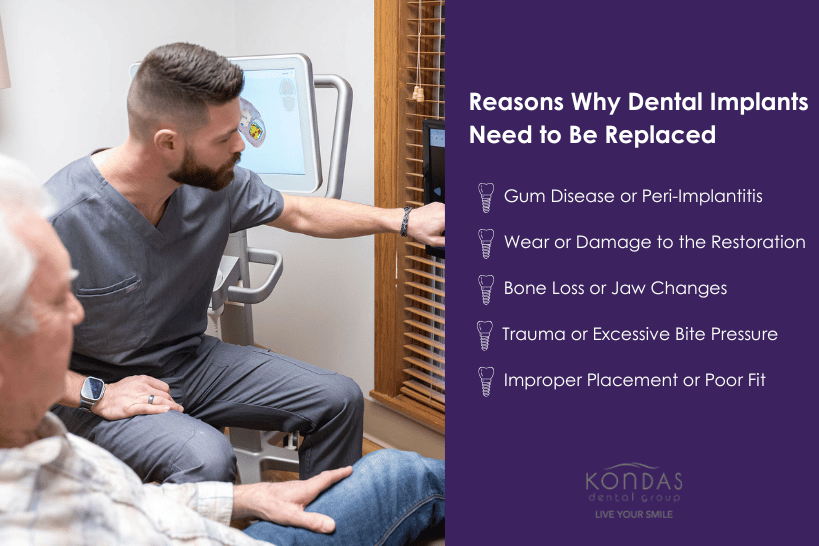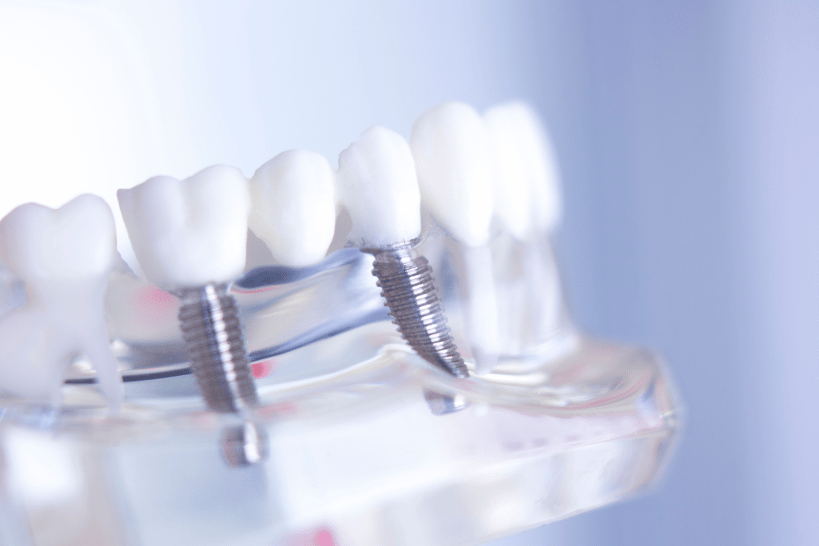If you’re considering dental implants in the Dayton area, you’re probably wondering one big question: how often do dental implants need to be replaced?
Dental implants are one of the most durable and natural-looking ways to restore missing teeth. With proper care, they can last for decades—even a lifetime. But like any dental restoration, some parts may eventually need replacement or maintenance over time.

What Are Dental Implants?
A dental implant is a small titanium post surgically placed into the jawbone, replacing the root of a A dental implant is a small titanium post surgically placed into the jawbone, replacing the root of a missing tooth. Over time, the implant fuses with the bone through a natural process called osseointegration, creating a solid foundation for a replacement tooth.
Each implant is made of three main parts:
- Implant body (fixture): the titanium post inserted into the bone.
- Abutment: a connector piece that links the implant to the visible tooth.
- Restoration: the crown, bridge, or denture that attaches on top.
This structure allows implants to function and look just like natural teeth, without affecting neighboring teeth.
How Long Do Dental Implants Last?
According to recent studies, the titanium implant post can last 20 years or more, and often a lifetime. The key factor is bone health and oral hygiene. Once osseointegration is complete, the implant becomes a permanent part of your jaw.
However, the restoration on top (the crown, bridge, or denture) typically experiences more wear and tear. Most crowns last 10 to 15 years before they may need replacement due to natural biting forces, minor fractures, or discoloration.
In short:
- Implant post: 30 + years, often lifelong
- Abutment: may last decades, but can loosen or need adjustment
- Crown/denture: usually 10–15 years before replacement
Types of Dental Implants Offered at Kondas Dental Group
Patients interested in dental implants typically can choose from several modern implant solutions tailored to their needs:
Traditional Dental Implants
These are considered the gold standard in dental implantology. When cared for properly, the titanium post can last 25 years to a lifetime, and the crown or bridge attached may need to be replaced every 10 to 15 years. Because they integrate deeply with the jawbone, traditional implants tend to have the longest track record for durability.
Mini Dental Implants
Mini implants are smaller in diameter and are often used in situations with less bone volume. While they are still effective and can last many years, they may not last as long as traditional implants due to their smaller size.
Most mini implants can last 10 to 15 years, but their performance heavily depends on bite pressure and how well they’re maintained. They’re often used for temporary or less demanding restorations.
Full-Arch Implants (All-on-Four)
The All-on-Four system typically uses traditional-sized implants and is designed to support a full arch of teeth. The implant posts can last 20+ years or more, with proper bone health and oral care. The attached prosthetic arch (teeth) may need to be replaced or relined every 10 to 15 years, depending on wear and hygiene habits.
Each of these options has slightly different longevity expectations, but all share one thing: strong, predictable long-term results when properly maintained.
When Do Dental Implants Need to Be Replaced?
Most patients never need to replace the actual implant post unless a problem occurs. The most common reasons for replacement or repair include:
1. Gum Disease or Peri-Implantitis
Poor oral hygiene can lead to inflammation and bone loss around the implant, a condition known as peri-implantitis. When detected early, it can be treated; if left untreated, the implant may fail and require replacement.
2. Wear or Damage to the Restoration
While the implant itself is durable, the attached crown or denture can chip, crack, or loosen over time. Replacement of the restoration is normal and part of long-term maintenance.
3. Bone Loss or Jaw Changes
Bone density can change naturally with age or after significant health issues. If too much bone is lost, the implant might become unstable and need to be replaced.
4. Trauma or Excessive Bite Pressure
Accidents, sports injuries, or chronic teeth grinding (bruxism) can stress the implant or restoration, leading to damage.
5. Improper Placement or Poor Fit
Rarely, implants placed in non-ideal bone conditions or at incorrect angles can fail prematurely. Choosing an experienced provider like Kondas Dental Group significantly reduces this risk.
In short:

How Often Should Dental Implants Be Replaced?
For most patients, dental implants do not require replacement. With proper care, the implant body can last 20 years or more.
The crown or bridge, however, may need to be replaced every 10 to 15 years, depending on chewing habits, material, and maintenance. You might need an evaluation or replacement if you notice:
- Movement or looseness around the implant
- Pain, swelling, or bleeding gums
- Cracks, chips, or wear on the crown
- A change in your bite or discomfort while chewing
Routine dental visits allow your dentist to spot these issues early — saving you time, money, and discomfort later.
How to Extend the Lifespan of Your Dental Implants
Good habits are the secret to long-lasting dental implants. To maximize your implant’s lifespan:
1. Maintain excellent oral hygiene. Brush twice daily with a soft-bristle toothbrush and non-abrasive toothpaste.
2. Floss and clean around implants daily. Use floss threaders, interdental brushes, or a water flosser.
3. Schedule regular professional cleanings and checkups. Visit your dentist every six months for cleanings and early detection of potential issues.
4. Avoid smoking. Smoking reduces blood flow to the gums and increases the risk of implant failure.
5. Wear a night guard if you grind your teeth. Protects both your implants and natural teeth from excessive stress.
6. Eat a balanced diet. Calcium- and vitamin-rich foods help maintain bone density.

Your Investment in Long-Term Oral Health
Dental implants represent one of the most reliable solutions for replacing missing teeth, offering exceptional longevity when properly cared for. While the initial investment may seem significant, the fact that the implant post can last a lifetime—with only occasional crown replacements—makes them highly cost-effective over time.
If you have questions, the dental professionals at Kondas Dental are here to answer them. Please don’t hesitate to call us at 937-787-5062!
